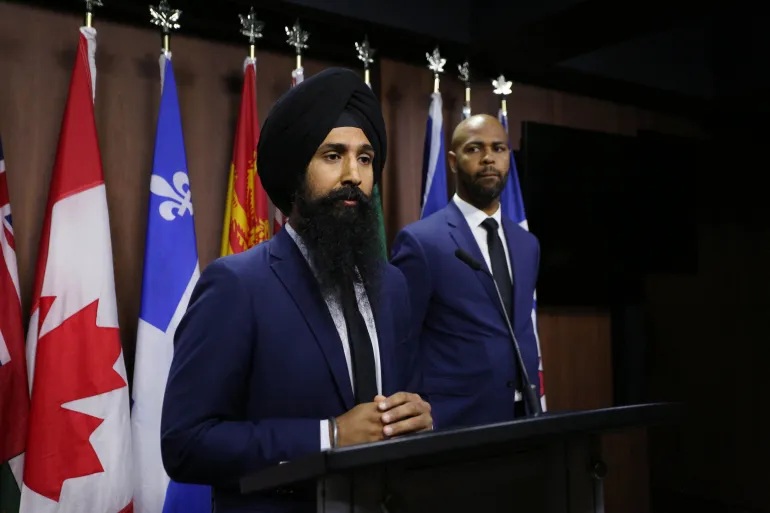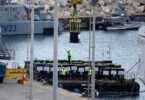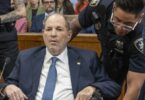OTTAWA : Sikh and Muslim leaders in Canada have called on the government to do more to prevent potential threats against their communities, after Ottawa announced a probe of possible links between India and the killing of a prominent Sikh leader in the country’s westernmost province.
Speaking to reporters on Tuesday morning, World Sikh Organization of Canada board member Mukhbir Singh said this week’s revelations may “have shocked many Canadians”.
“But it was not a surprise to the Sikh community,” he said during a joint news conference in Ottawa with the National Council of Canadian Muslims (NCCM) advocacy group.
A day earlier, Prime Minister Justin Trudeau told Parliament that Canada was investigating “credible allegations of a potential link” between Indian government agents and the June 18 killing of Hardeep Singh Nijjar outside a Sikh temple in British Columbia.
India swiftly rejected the allegations as “absurd” and accused Canada of harbouring Sikh “terrorists and extremists”.
Nijjar, who was involved with groups seeking a sovereign Sikh state in India, had been designated as a “terrorist” by New Delhi, according to media reports.
But Singh said on Tuesday that India has long targeted Sikhs in Canada with “espionage [and] disinformation”.
He added that his organisation was aware of other current threats against Canadian Sikhs, some of whom have been told to “make changes to their pattern of living” to assure their safety. He did not provide further details on the source of these threats.
Speaking alongside Singh, Stephen Brown, head of NCCM, called the killing of Nijjar “an unprecedented attack against Canadian sovereignty, full stop”.
“We’re all in this together,” Brown told reporters. “Because when a Canadian is attacked, when he or she has the audacity to speak about human rights and justice, all of us are at risk.”
Decades-long tensions
Canada has not definitively linked India to Nijjar’s killing, and it has not yet released evidence to back up its claims.
But on Tuesday, Trudeau doubled down on his decision to make the investigation public, saying it came after months of deliberation and analysis. He also urged India “to take this matter with the utmost seriousness”.
“We are not looking to provoke or escalate,” the prime minister told reporters. “We are simply laying out the facts as we understand them, and we want to work with the government of India to lay everything clear.”
The allegations have tanked already frosty relations between Canada and India, with both countries expelling the other’s diplomats in the wake of Trudeau’s announcement.
Undergirding the situation is a decades-long Sikh secessionist movement, which stretches back to the 1947 partition of India and Pakistan. The movement reached its peak in the 1980s, with supporters pushing for the creation of an independent homeland of Khalistan in the current Indian state of Punjab.
The storming of the Golden Palace, the most significant holy site in Sikhism, by the Indian military in 1984, and the resulting assassination of Prime Minister Indira Gandhi by two of her Sikh bodyguards, prompted an escalation that included Sikh-led bombings and what Sikh leaders call the continuing persecution of the wider Sikh community in India and abroad.
Meanwhile, New Delhi has for years accused Ottawa of taking a lax approach to Sikh separatists in Canada, which has the largest Sikh community outside of India.
Indian Prime Minister Narendra Modi most recently scolded Trudeau during a brief meeting on the sidelines of the G20 Summit in New Delhi earlier this month.
In a statement at the time, New Delhi accused Sikh protesters in Canada of “promoting secessionism and inciting violence against Indian diplomats, damaging diplomatic premises and threatening the Indian community in Canada”.
Trudeau on Monday said he had shared information about the possible link between the killing of Nijjar and Indian government agents during his brief G20 meeting with Modi.
He urged the Indian government to “cooperate with Canada to get to the bottom of this matter”, calling “any involvement of a foreign government in the killing of a Canadian citizen on Canadian soil is an unacceptable violation of our sovereignty”.
‘Truly shocking’
Nijjar, a Canadian citizen, was fatally shot on June 18 outside a Sikh temple in Surrey, British Columbia.
A prominent community leader and activist, Canadian media reported that he was involved with a group called “Sikhs for Justice”, which pushes for an independent Sikh state in India.
According to the Globe and Mail and other media reports, the 45-year-old had been designated as a “terrorist” by the Indian authorities, who have said he had previously plotted to kill a Hindu priest.
Speaking to reporters on Tuesday, Singh of the World Sikh Organization of Canada said he believed the killing was the “tip of the iceberg”.
He called on Canada to bring those responsible to justice, to take further steps to protect Sikhs, to review India’s diplomatic and intelligence gathering operations in the North American country, and to end intelligence sharing with New Delhi.
“The younger generation [of Sikhs] that grew up in Canada, they grew up hearing stories about persecution, with a fear of speaking out too much and you might get on a list or be targeted,” he said.
“So to see that happening right now, in 2023, in Canada, it certainly is shocking and I hope the larger community sees that and understands how truly shocking this is.”
Courtesy: aljazeera







